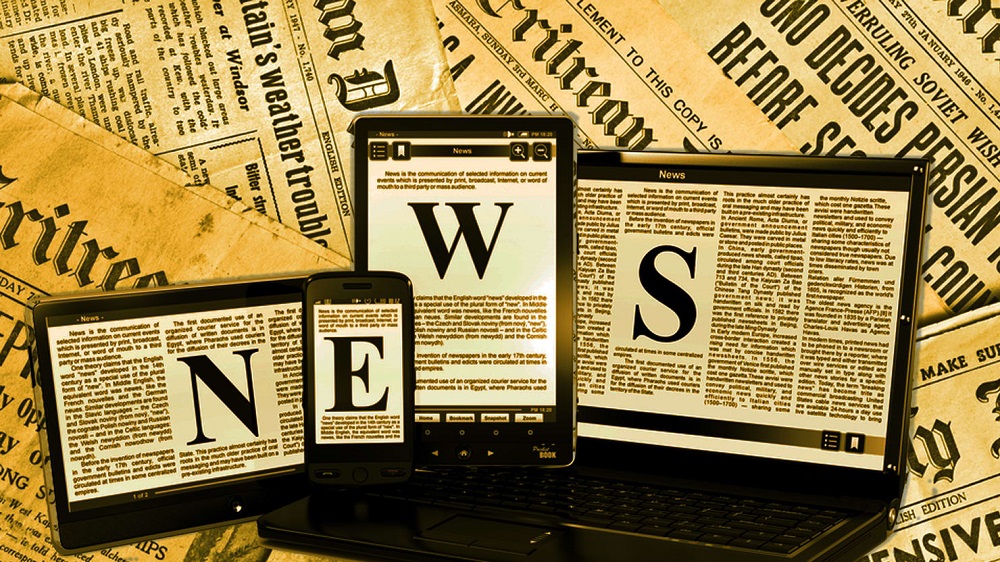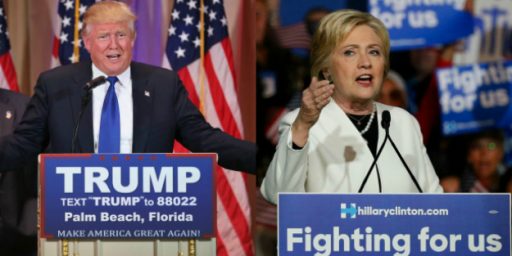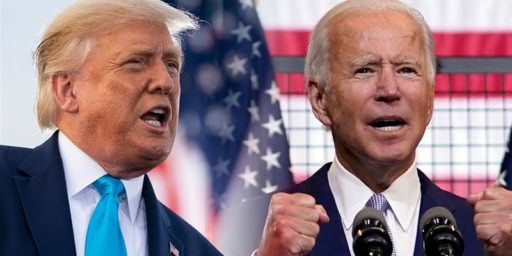A Reminder about Media Bias
Media bias is real, but it isn't what many claim it to be.

In a recent column at WaPo, Dan Drezner noted the following:
Never forget that the most important media bias during an election year is that the media wants a competitive race. And so campaign coverage will always raise the specter of a close race or frame it as such.
For example, consider this Associated Press story titled “Uncertainty dominates presidential campaign’s final stretch.” The reporters say, “As the candidates move beyond trouble-free conventions and into the final phase of the 2020 election season, both sides acknowledge the contest is tightening.” That seems pretty darn definitive!
Except that the story features a lot of claims to this effect by the Trump campaign. The Biden campaign’s contribution is limited to Biden senior adviser Anita Dunn saying, “This campaign has always known that it’s going to be a close race, it’s going to be a tough race. … It’s a polarized nation and we expect this kind of tightening.” That is the Crash Davis of campaign-cliche quotes.
The most important thing to media outlets is to get readers/viewers/listeners. And a horse race, which is the default frame for US elections every cycle, attracts more clicks than does a headline about the basic stability of the contest.
And, of course, the anxiety level of many citizens about a possible second Trump term leads to even more clicks when they see headlines about potentially tightening races.
Speaking of anxiety, there is a lot of it out there as well about the degree to which polling and modeling got 2016 wrong/was misinterpreted by many (especially the modeling) and so this just heightens the need to talk like things are close because that is safer. That is: if one talks about a close race, it cuts down on the chances of seeming to have been wrong once the results come in.
In addition to all of the above, there is a bias in much of the mainstream press towards fairness, which often translates into a crude both-siderism that treats even the abnormal by Trump as normal to one degree or the other.




Why is the media so often spoken of as a more or less uniform entity? For a start, I’d guess that most people under the age of 50 (and maybe 60) get their news from Internet sources (using the word “source” loosely) — and I’d further guess from sources that mirror their own opinions. Beyond that, even if you go by the main news sources (NY Times, Fox news, etc), the media seems to cover a wide range of views — with again most people simply looking at the media that matches their opinions.
As far as I can tell (and I’m definitely not a media person), there’s a much wider diversity of easily accessed opinion now than there’s ever been. The irony is that many (maybe most) people are so self-limiting that they’re only exposed to that portion which confirms their current opinion.
@Northerner:
I can offer a perspective on this. First, since the emergence of journalism as a concept/craft it’s often been talked about a broad category (“The Fourth Estate” emerges as a concept in the late 1700’s).
More importantly, the history of media for most of the 20th century was one of consolidation. As journalism became professionalized, the amount of outlets shrank quite a bit. That combined with the rise of Mass Media meant that by the 70 and early 80’s, things were actually pretty hegemonic. Its not a coincidence that Rush Limbaugh and nationally syndicated right wing media came up by defining itself against “mainstream media.”
So, even though we’ve returned to an American (politicized) media environment that is much closer to what journalism looked like for most of our history, folks are still describing it in terms from the previous age (in part because that’s an easier way to talk about things).
@Northerner: I was not especially explicit in my post, although I do note in the last paragraph that I am talking about the “mainstream press,” and am very much thinking here about the professionalized journalists that @mattbernius discusses.
The broader commentariat, even those that pretend like they are “news” are not what I am talking about.
@Steven L. Taylor:
Interesting, because from what I’ve observed, the hard core Trump supporters have–or at least say they have–eschewed anything but the most crackpot of bloggers as their “news” sources. When your preferred media outlets are Infowars, Breitbart, The Gateway Pundit, and The Conservative Tree House, and you scorn The National Review, the Washington Times, and The American Conservative as left wing rags, you have probably advanced well beyond any possibility of rational discourse.
@CSK:
Of course, if you have gone that route, you left the path of journalism.
@Steven L. Taylor:
Indeed. That’s to be expected, because they view actual journalists–even those working for Fox–as liars and traitors dedicated to the destruction of the United States.
They hate reporters. They love and trust only commentators such as Hannity, Ingraham, and Limbaugh.
“Fairness” as they practice it departs a good deal from fair. Hence Krugman’s – opinions differ on shape of the earth. They are bending over backwards to not quite say that somethings badly not right with Trump.
It’s nice if media enlighten the electorate, but never forget their business is peddling papers.
@Northerner: I’d like to see hard data. I have repeatedly seen the claim that more people get their news from the broadcast network evening news shows than anything else. The best analysis I’ve seen of 2016, Sides et al, “Identity Crisis”, said that internet ratfracking had little to no real influence, but without elaborating.
What I do think I see is that journalists use Twitter to build their personal brands so they’re deeply involved online and tend to confuse Twitter with reality. I see a lot of pixels expended on Twitter fights that don’t rise to tempest in a teapot
@mattbernius:
That sounds about right, tho’ I think it’s an anachronism.
@Steven L. Taylor:
Fair enough. I tend to think of media as every information source out there. Possibly because I get most of my information from the net — its been awhile since I listened to TV news or bought a newspaper — and I’d bet heavily the same is true for most people I know (completely anecdotal with no pretense of having done any kind of study).
@CSK:
Yup. And all the while convince themselves they are consuming “news.”
@gVOR08:
Indeed. This is precisely the point.
@gVOR08:
I was careful to say I was guessing (and I’ll add, it’s, based on the small number of people I know). However, if I was to gamble on the outcome of a study, I’d probably give 2-1 odds that most people under 50 get most of their news via the Net. Curiously enough, I think that fits perfectly with the idea that the Net isn’t influencing them, because I also suspect most people only go to sites that confirm what they already believe — there’s no change of opinion involved.
Your point about a study is a good one; unfortunately when I Googled I couldn’t find one (though a lot of people give opinions — like me — without referencing a study).
@Northerner: Sure and same here: I watch very little TV news and haven’t bought a physical newspaper in some time.
However, most of the actual news I consume is consumed from sources that in the past would have been either printed newspapers or the wire services that often also led to print.
Haven’t paid any attention to Limbaugh since his early syndication years (late ’80s?). I thought I would be open minded and give him a chance.
He would state that his program is not a news broadcast but is an entertainment venue. This relieves him of any obligation for accuracy in what he says.
One of his taglines was “I’ll tell you what to think.”
I do recall an attempt by someone to produce a program called “After the Rush Hour” that would fact check the bloviations of Limbaugh’s daily show. The story that I remember was that Limbaugh sued because his name was being used. He won that battle.
And he calls himself Mister Free Speech!
I grew up watching Walter Cronkite and The Huntley-Brinkley Report. I cut my cable TV 6 years ago and gave away my TV. So I get all my news from online sources. Mostly local Seattle news outlets. Then the Washington Post, 538, Daily Beast, The Atlantic, BBC and for extra spicy news the Daily Mail is good. And as a physician, I also look at NEJM, and most recently, Statnews.com
I use the website mediabiasfactcheck.com to see how they evaluate new sources. BTW, they evaluate OTB as “Left-Center Bias” with “High” factual reporting.
On the same token, peruse CNN sometime. You’ll see weasel words (generally tacked on to the end of the lede) and lots of adjectives. I’m not certain that there is a media outlet these days that isn’t at least subtly biased, but to be fair they’re trying to survive peddling information to an audience that largely only wants to hear validation of what it already believes. How we consume media has fundamentally changed.
@mattbernius: I like your analysis. I’ve thought that we are in a time much like the age of “yellow journalism” of the 1890’s and so on. The times that gave us the Spanish-American war, which was whipped up by WR Hearst via his newspapers.
Broadcasting, and its limited bandwidth, changed all that, but the internet has superseded this (along with the Fairness Doctrine).
@HarvardLaw92:
The reality is that we went through an anomalous period in which we shared a media landscape (first with limited radio stations and then with limited TV channels for news). Prior to that period we had partisan newspapers and we are back to that, and extremely so.
(And yes: the primary goal is to entertain the audience, not to provide news, especially when we are talking about cable channels).
@JDM:
Interesting. I was unaware of that site–thanks for pointing it out.
@Steven L. Taylor:
100% this.
@HarvardLaw92:
There has never been an outlet at any time that isn’t at least subtly biased. That was in part the problem with Journalism’s professional obsession with “objectivity” during the mid and latter half of the 20th century. It ended up enabling everyone to pretend they *didn’t* have biases through really bad “bothsider-ism” reporting. The far better thing for everyone is for folks to try and state their biases up front and work to accurately portray facts on the ground as they understand them.
How news sources are most often differentiated is on what is covered and the scope of that coverage.
MSNBC and Fox cover the same things and different things in different ways. Fox will cover a violent demonstration in Portland more and differently than does MSNBC. Conversely, MSNBC will cover Trump’s latest asinine tweet more and differently.
And there are the outlier coverage – The not in the overlap of a Venn diagram: stories that they cover the other does not.
I have not checked, but I would imagine Fox is not hyping DeJoy’s campaign donation fraud / mail fraud story.